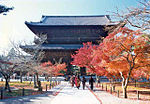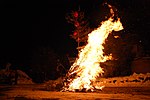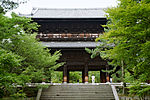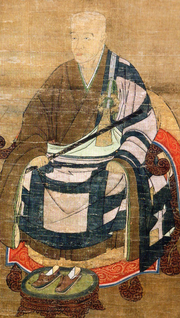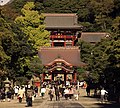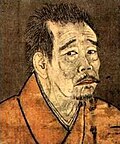Mountain System, a Japanese network of Zen temples (Gozan Seidō) Tell Halaf, a Syrian archeological site near the city of Guzana or Gozan This disambiguation...
344 bytes (82 words) - 07:22, 2 February 2020
Gozan no Okuribi (五山送り火, roughly "The Five Mountainous Send-Off Fires"), more commonly known as Daimonji (大文字, roughly "big letter"), is a festival in...
6 KB (665 words) - 22:09, 15 June 2024
Five Mountain System (redirect from Kamakura Gozan)
Mountains and Ten Monasteries System (五山十刹制度, Chinese: Wushan Shicha, Japanese: Gozan Jissetsu Seido) system, more commonly called simply Five Mountain System...
19 KB (2,462 words) - 13:00, 31 August 2024
Literature of the Five Mountains (redirect from Gozan Bungaku)
The Gozan Bungaku or literature of the Five Mountains (Japanese: 五山文学) is the literature produced by the principal Zen (禅) monastic centers of in Kyoto...
7 KB (873 words) - 19:28, 19 May 2024
the Five Great Zen Temples of the 12-century Kamakura period (Kamakura Gozan), developed as a form of meal that emphasized frugality and simplicity....
119 KB (12,028 words) - 16:47, 31 October 2024
was favoured by the shōgun. In the beginning of the Muromachi period the Gozan system was fully worked out. The final version contained five temples of...
54 KB (6,036 words) - 05:06, 19 October 2024
Kenchō-ji (category 1250s establishments in Japan)
Japan, which ranks first among Kamakura's so-called Five Great Zen Temples (the Kamakura Gozan) and is the oldest Zen training monastery in Japan. These...
13 KB (1,505 words) - 21:46, 24 September 2024
Burning the Character Big, Japan Diwali, India Gozan no Okuribi, Kyoto, Japan The Oroqens' Fire Festival (オロチョンの火祭り), Hokkaido, Japan Sagicho Fire Festival...
2 KB (132 words) - 16:38, 30 June 2024
Chinese literature, calligraphy and painting. The Japanese literature of the Five Mountains (Gozan Bungaku) reflects this influence. One of his students...
99 KB (11,872 words) - 19:45, 12 October 2024
Kyoto (redirect from Kyōto, Japan)
of the 3 great festivals of Japan, culminating in a massive parade on July 17. Kyoto marks the Bon Festival with the Gozan no Okuribi, lighting fires on...
72 KB (6,143 words) - 08:15, 31 October 2024
Nanzen-ji (category National Treasures of Japan)
(天龍寺, Tenryū-ji) is considered to be one of the so-called Kyoto Gozan (京都五山, Kyōto gozan) or "five great Zen temples of Kyoto", along with Shōkoku-ji (相国寺...
11 KB (798 words) - 04:27, 10 September 2024
headed by a Zen Buddhist monk from one of the so-called Kyoto Gozan (京都五山, Kyoto gozan) or "five great Zen temples of Kyoto", consisting of Nanzen-ji...
12 KB (699 words) - 13:30, 5 May 2024
Kennin-ji (category 1200s establishments in Japan)
branch of Rinzai Buddhism. It is considered to be one of the so-called Kyoto Gozan or "five most important Zen temples of Kyoto". Kennin-ji was founded in...
10 KB (929 words) - 13:37, 7 September 2024
Satoshi Kako (category CS1 Japanese-language sources (ja))
including Traditional Play Thoughts. He died on 2 May 2018. Takahashi Gozan Special Award in 1985. On 31 March 2023, Google celebrated Satoshi Kako's...
2 KB (231 words) - 04:51, 11 June 2024
Kantō, Aomori Nebuta, Tokushima Awa Dance Festival, Gion Festival, and Gozan no Okuribi in both Kyoto, Gujo-Hachiman Bon Dance Festival, Hakata Gion...
28 KB (2,786 words) - 11:04, 21 September 2024
Edo neo-Confucianism (redirect from Neo-Confucianism in Japan)
brought to Japan during the late Kamakura period. It was spread as basic education for monks in training and others of the Five Mountain System (Gozan) network...
14 KB (1,808 words) - 15:42, 11 March 2024
Burning of the Character Big (category Annual events in Japan)
Festival Farewell Fires of the Five Mountains in Kyoto Sagichō Fire Festival Gozan Okuribi Ritual Fires|五山送り火 (Discover Kyoto) Hakone Gora Summer Festival...
2 KB (164 words) - 17:24, 28 October 2024
Ennin (category People of Heian-period Japan)
CE), better known in Japan by his posthumous name, Jikaku Daishi (慈覺大師), was a priest of the Tendai school of Buddhism in Japan, and its third Zasu (座主...
7 KB (717 words) - 02:33, 10 March 2024
Eisai (category Articles containing Japanese-language text)
27 May 1141 – 1 August 1215) was a Japanese Buddhist priest, credited with founding the Rinzai school, the Japanese line of the Linji school of Zen Buddhism...
12 KB (1,475 words) - 13:58, 7 September 2024
Kamakura Gozan – see Gozan Seido. kami (神) – term broadly meaning "deity", but having with several separate meanings. deities mentioned in Japanese mythologies...
43 KB (5,264 words) - 18:09, 5 May 2024
Kamakura (redirect from Kamakura, Japan)
to represent Japan in the world's collective imagination. Kamakura also hosts the so-called Five Great Zen Temples (the Kamakura Gozan). The architectural...
62 KB (7,116 words) - 08:17, 31 October 2024
Japanese Buddhist architecture is the architecture of Buddhist temples in Japan, consisting of locally developed variants of architectural styles born...
50 KB (5,730 words) - 00:55, 20 September 2024
Komusō (redirect from Flute monks f japan)
policing the komusō, and instructing them to act as spies. Travel around Japan was heavily restricted in the Edo period, but the longer versions gave the...
38 KB (4,469 words) - 13:26, 13 October 2024
Tōfuku-ji (category 1230s establishments in Japan)
Higashiyama-ku in Kyoto, Japan. Tōfuku-ji takes its name from two temples in Nara, Tōdai-ji and Kōfuku-ji. It is one of the Kyoto Gozan or "five great Zen temples...
12 KB (1,285 words) - 05:12, 8 October 2024
Rinzai school (category Articles with Japanese-language sources (ja))
Japanese Zen masters who did not travel to China to study.[citation needed] In the beginning of the Muromachi period, the Five Mountain System (Gozan)...
29 KB (3,401 words) - 04:50, 28 October 2024
Ōtani Kōzui (category People of Meiji-period Japan)
Count Ōtani Kōzui (大谷 光瑞, 27 December 1876 – 5 October 1948) was a Japanese Buddhist leader and explorer who was the 22nd Abbot of Nishi Hongan-ji and...
3 KB (296 words) - 01:53, 7 July 2024
Obon (category Buddhist festivals in Japan)
(お盆) or just Bon (盆) is a fusion of the ancient Japanese belief in ancestral spirits and a Japanese Buddhist custom to honor the spirits of one's ancestors...
30 KB (3,376 words) - 21:00, 21 September 2024
Gyōki (category People of Nara-period Japan)
Gyōki (行基, 668–749) was a Japanese Buddhist priest of the Nara period, born in Ōtori county, Kawachi Province (now Sakai, Osaka), the son of Koshi no Saichi...
7 KB (959 words) - 13:02, 16 January 2023
Ikkyū (category Articles containing Japanese-language text)
Chinese culture and language as part of the curriculum, a method termed Gozan Zen. He was given the name Shuken, and learned about Chinese poetry, art...
14 KB (1,652 words) - 14:00, 25 October 2024
Enkū (category Articles containing Japanese-language text)
Enkū (円空) (1632–1695) was a Japanese Buddhist monk, poet and sculptor during the early Edo period. He was born in Mino Province (present-day Gifu Prefecture)...
5 KB (605 words) - 18:21, 25 October 2024


